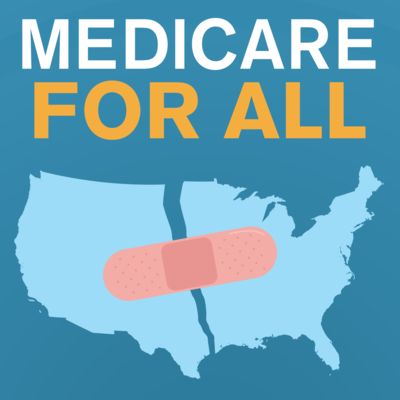episode 61: SiCKO: the 15 Year Reunion
In spring of 2007, Michael Moore released a blockbuster documentary showing the extraordinary damage the U.S. healthcare system inflicts upon ordinary Americans. Story by story, SiCKO pulled back the veil of how ordinary illness and injury, when paired with deadly healthcare profiteering, leads to suffering, financial ruin, and even death.
15 years later, together with our friends at Progressive Democrats of America, we are bringing together the patients featured in SiCKO, whose extraordinary stories impacted Congress, shaped the Affordable Care Act, and helped to launch the modern Medicare for All movement.
https://www.youtube.com/watch?v=vqRCZhx_280
Show Notes
Our guests today are:
Donna Smith and husband Larry experienced financial ruin after multiple health crises forced them into medical debt, bankruptcy, and the loss of their home.Adrian (Campbell) Montgomery, despite being fully insured, had to drive to Canada to get affordable treatment for cervical cancer. Reggie Cervantes was a 9/11 first responder who has suffered from lung issues caused by her lifesaving work in New York City.Lee Einer was a health insurance company “hit man,” whose role was to find any loophole to avoid paying large medical bills. Since then he's become a whistleblower, shining a light on fraud and dirty tricks by the healthcare industry.
SiCKO was released just in time to have a major impact on the 2008 Presidential elections, and - I think - really helped push healthcare to the top of the agenda within the Democratic Party, which won the Presidency, the House, and the Senate. This led to the Affordable Care Act, which although it preserved the profits of the healthcare industry and was FAR short of a just or affordable system, addressed exactly some of the health insurance industry’s most disgusting practices that were featured in the film.
Aside from the ACA, the film was also a major event in the Medicare for All social movement, which grew tremendously across the country. Gillian shares how the film convinced her that her struggles with the healthcare system wasn't just a personal problem, but a systemic problem for the whole nation. That launched her into healthcare justice organizing.
Thanks in large part to SiCKO pulling back the curtain on the worst behaviors of the insurance industry, a number of those practices were banned by the Affordable Care Act, including:
Denying coverage to people with pre-existing conditions;Recissions (retroactively canceling your insurance coverage); andLifetime caps or annual caps on coverage.
Has anything changed for our guests?
Donna shares that without the ACA she would never have been insurable, and her health forced her to leave the job that provided her with employer insurance. The expansion of Medicaid was also a huge step for people without insurance. But since then, we've seen the insurance companies make even more money, and we're facing more attacks, including the efforts to privatize Medicare. The biggest change for Donna is that she has aged into Medicare, and now knows the security of having coverage.
With her previous cancer diagnoses, Adrian acknowledges that due to the ACA ban on denying coverage to patients with pre-existing conditions, she's insurable, but not much else has changed. Her insurance company vetoed her doctor's plan of care for her third bout with cancer, and made her go through a different surgery before they'd cover the hysterectomy her doctor determined she needed. She almost died during that surgery, and after all of that, it wasn't successful.
